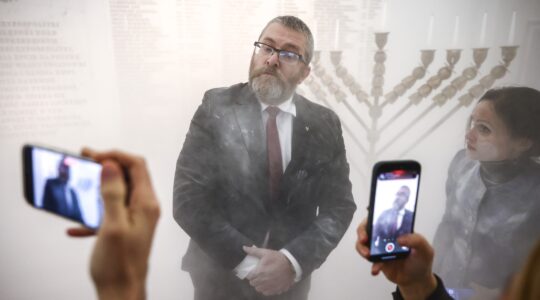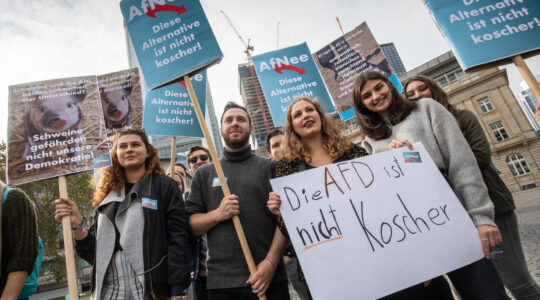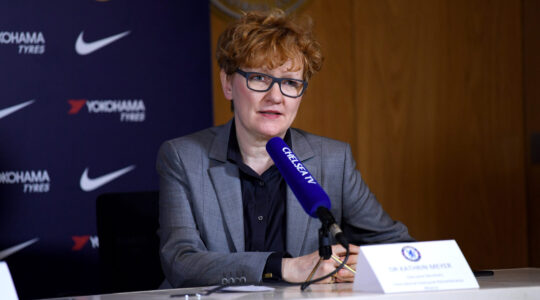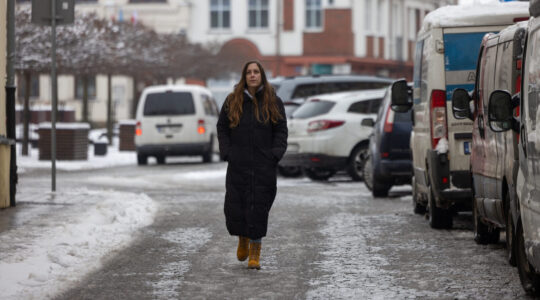MOSCOW (JTA) – Vissarion Manasherov left his city as the bombs were falling.
One day later, on Monday, with bombs still falling, he returned to Gori, a city at the edge of war, to convince the few Jewish families still in the area to leave. The Russians were at their doorstep, he told them.
Manasherov, the community’s leader and a local emissary for the Jewish Agency for Israel, said he fled to the Georgian capital of Tbilisi with a wave of 200 Jews, leaving fewer than a dozen compatriots behind.
“I was the last to leave,” he said. “But I went back. And we’ll go back.”
As the conflict between Georgia and Russia moved toward an uneasy stalemate Tuesday, the migration of refugees away from the devastated capital of the breakaway republic of South Ossetia spread further and more Jews emerged from the fog of war.
Ossetians and Georgians fled north to Russia through a mountain tunnel or south to Tbilisi, while others boarded planes to Israel.
The evacuation effort has been a lightning, joint project of international Jewish organizations working in close conjunction with the Israeli government. The Israeli Embassy has become a hub of activity where leaders and refugees have shuttled to and from since the conflict began.
The American Jewish Joint Distribution Committee, one of the agencies working on the ground, estimates that more than 700 Jews have been displaced in recent days.
Jews caught on both sides of the conflict looked back at the damage with starkly different political viewpoints.
“Who’s at fault? Who bombed whom? Who fired the first shot?” Manasherov said by telephone from the Israeli Embassy in Tbilisi. “War is war. It’s hard to say who is right and who is at fault.”
Russia has taken a hard line against Georgian President Mikheil Saakashvili, branding his initial incursion into South Ossetia as genocide and strongly defending its campaign into undisputed Georgian territory.
Following days of fighting, which left an estimated 2000 dead and scores more wounded, leaders from Georgia and Russia took tentative steps toward ending the latest conflagration in the war-weary Caucasus region – Russia’s largest use of force outside its borders since 1989.
On Tuesday, Russian President Dmitry Medvedev announced an end to attacks beyond Georgia’s border with South Ossetia while Saakashvili pressed a cease-fire agreement. Saakashvili also announced to thousands in Tbilisi that Georgia would leave the Commonwealth of Independent States, an umbrella organization largely controlled by Russia.
The conflagration began Aug. 8 when Russian tanks and soldiers poured into South Ossetia, which fought a war for independence from Georgia in the early 1990s. Russia said it was protecting its citizens and peacekeepers from a Georgian attempt to secure the capital, Tskhinvali.
Amid the uncertainty, Jewish rescue and relief agencies worked throughout the fighting and planned to continue their work to assist refugees in need.
The Jewish Agency helped evacuate 31 Georgians to Israel aboard special flights Tuesday. The agency said others have applied to make aliyah and their paperwork is being expedited.
Alex Katz, the Jewish Agency’s emissary to the former Soviet Union, accompanied Gori’s community leader Manasherov to the city on Monday and saw columns of Georgian troops leaving the city.
The JDC, meanwhile, has eight representatives in the region helping to locate and rescue local Jews, as well as provide food and medical relief in both Georgia and Russia.
The head regional representative said the JDC had helped evacuate a Jewish family from a bombed-out building in Gori on Monday.
Most of the more than 200 Georgian Jewish refugees who have made their way to Tbilisi are staying with relatives and friends there. Between 10,000 to 12,000 Jews live in Georgia, mostly in the capital.
The local Chabad community, headed by Rabbi Avraham Michaelashvili, organized a three-day blood drive for victims, and Chabad rabbis have worked to ensure safe passage for a group of 50 Israeli tourists vacationing on the Black Sea, according to reports from the Chabad Web site.
In the South Ossetian city of Tskhinvali, the JDC listed the number of Jews at 19, as of one month ago. Before wave after wave of ethnic conflict shook the foundations of Tskhinvali starting in 1992, there was a growing Jewish community of more than 2,000 people in the city of 30,000.
Nothing was heard for days from these refugees.
But the JDC representative in Vladikavkaz, the Russian regional capital closest to the conflict, said they had located five of the Tskhinvali Jews, including girls aged 6 and 16. The girls had made their way to the Russian city with the younger girl’s grandmother after spending several days huddled in a basement without food or water.
The representative, who spoke on condition of anonymity owing to safety concerns, said the experience of hiding from the shelling in the Ossetian capital had badly shaken the teenager.
On the Russian border, the representative said the Russian government was refusing help from international aid organizations and the JDC was the only nongovernmental organization operating in Vladikavkaz.
In the United States, the Conference of Presidents of Major American Jewish Organizations, alongside a group that advocates for Jews in the former Soviet Union, NCSJ, released a statement rebuking Russia for its forays into Georgian territory and calling for an end to the hostilities.
“We urge that the cease-fire be implemented fully and immediately, and that the status quo be re-established,” the statement said.
Local Jewish groups were more reluctant to take sides.
JTA has documented Jewish history in real-time for over a century. Keep our journalism strong by joining us in supporting independent, award-winning reporting.





